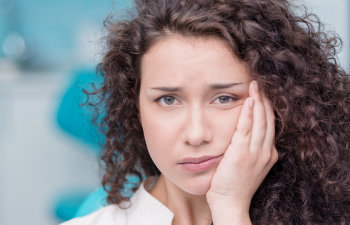
Teeth grinding, also known as bruxism, is a common condition that affects many people, often without them even realizing it. While occasional grinding may not cause significant harm, frequent or severe bruxism can lead to a host of dental problems, including tooth damage, jaw pain, and headaches. Understanding the causes and triggers of teeth grinding, what can make it worse, and how to treat it is essential for protecting your oral health. At Northern Virginia Sleep Solutions in Alexandria, Dr. Hye Park specializes in non-invasive treatments for bruxism, providing personalized care to help you find relief.
What Causes Teeth Grinding?
Teeth grinding can be caused by a variety of factors, many of which are related to your overall health and lifestyle. Here are some of the most common causes:
1. Stress and Anxiety
Stress and anxiety are among the most common triggers for teeth grinding. When you’re under stress, your body may respond by clenching your jaw or grinding your teeth, often during sleep. This subconscious response can become a habit, leading to regular bruxism.
2. Sleep Disorders
Bruxism is often linked to sleep disorders such as sleep apnea. People with sleep apnea may grind their teeth as a response to interrupted breathing during sleep. This condition not only disrupts your sleep but can also lead to significant wear and tear on your teeth.
3. Misaligned Teeth
If your teeth are not properly aligned, your jaw may be forced to work harder to bring your teeth together when you bite or chew. This can lead to bruxism as your jaw muscles strain to compensate for the misalignment.
4. Medications and Substances
Certain medications, particularly those used to treat mental health conditions, can increase the likelihood of teeth grinding. Additionally, substances like caffeine, alcohol, and tobacco can exacerbate bruxism by stimulating your nervous system.
5. Personality Traits
Individuals with certain personality traits, such as being highly competitive, aggressive, or hyperactive, may be more prone to teeth grinding. These traits often correlate with higher levels of stress or anxiety, which can trigger bruxism.
What Makes Teeth Grinding Worse?
While understanding the causes of bruxism is important, it’s equally crucial to recognize what can make it worse. The following factors can intensify teeth grinding and its impact on your oral health:
1. Poor Sleep Hygiene
Lack of quality sleep can worsen bruxism. If you’re not getting enough rest, your body is more likely to engage in unconscious behaviors like teeth grinding. Poor sleep hygiene, such as irregular sleep patterns or sleeping in a noisy environment, can contribute to this.
2. Untreated Sleep Disorders
If you have a sleep disorder like sleep apnea and it’s left untreated, your risk of severe bruxism increases. The strain on your body from interrupted sleep can cause your jaw muscles to tense and grind your teeth more forcefully.
3. Increased Stress Levels
Heightened stress or anxiety can exacerbate teeth grinding. During particularly stressful periods, you may find yourself grinding your teeth more frequently or with greater intensity.
4. Consuming Stimulants
Caffeine and other stimulants can make bruxism worse by increasing your heart rate and stimulating your nervous system. This can lead to increased muscle activity, including teeth grinding, especially if consumed in the evening or before bed.
How to Treat Teeth Grinding
The good news is that there are effective treatments for bruxism that can help protect your teeth and reduce the associated discomfort. Dr. Hye Park at Northern Virginia Sleep Solutions offers a range of non-invasive treatments tailored to your specific needs.
1. Custom Oral Appliances
One of the most effective treatments for teeth grinding is the use of custom-made oral appliances, such as night guards. These devices are designed to fit your mouth comfortably and prevent your teeth from grinding against each other during sleep. They also help reduce strain on your jaw muscles.
2. Stress Management Techniques
Managing stress through relaxation techniques, therapy, or lifestyle changes can significantly reduce bruxism. Dr. Park can work with you to identify stressors and recommend strategies to help you manage them more effectively.
3. Treating Underlying Sleep Disorders
If your bruxism is related to a sleep disorder like sleep apnea, treating the underlying condition is crucial. Dr. Park specializes in non-invasive treatments for sleep apnea, which can help alleviate bruxism by addressing the root cause.
4. Behavioral Therapy
In some cases, behavioral therapy may be recommended to help you learn how to relax your jaw muscles and reduce the habit of teeth grinding. This approach can be particularly beneficial for those whose bruxism is linked to stress or anxiety.
5. Lifestyle Modifications
Making changes to your daily habits, such as reducing caffeine and alcohol intake, improving sleep hygiene, and practicing good oral care, can help minimize the impact of bruxism.
Find Relief from Teeth Grinding at Northern Virginia Sleep Solutions
Teeth grinding can have serious consequences for your oral health, but with the right treatment and care, you can protect your smile and reduce discomfort. At Northern Virginia Sleep Solutions in Alexandria, Dr. Hye Park offers personalized treatment plans to address bruxism and its underlying causes. Whether you need a custom oral appliance or assistance in managing stress, Dr. Park is here to help. Contact us today to schedule a consultation and take the first step towards a better night’s sleep and a healthier smile.
Posted on behalf of
1725 Duke St, Suite GR03
Alexandria, VA 22314
Phone: (571) 290-7977
nvsleepsolutions@gmail.com
Monday, Friday 8:00 AM – 3:00 PM
Tuesday - Thursday 7:00 AM – 5:00 PM